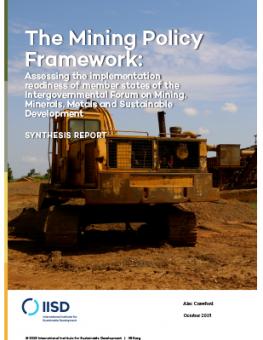
The Mining Policy Framework: Assessing the implementation readiness of member states of the Intergovernmental Forum on Mining, Minerals, Metals and Sustainable Development
This report synthesizes some of the key findings from the assessments and the capacity-building workshops with the Dominican Republic, Uganda and Madagascar to help them operationalize practices consistent with the Mining Policy Framework.
The International Institute for Sustainable Development (IISD), with support from the Canadian Department of Foreign Affairs, Trade and Development (DFATD), worked with three member states of the IGF—the Dominican Republic, Uganda and Madagascar—to help them operationalize practices consistent with the MPF.
This was a two-part process, beginning with an assessment of each country’s national laws and policies, and their corresponding readiness to implement the MPF. For this first part of the process, the assessments measured the readiness of the three member states to implement the six pillars of the MPF through existing government laws, policies and measures. The assessments were then used to help governments target their efforts in implementing the MPF, to inform capacity-building efforts, and to allow for monitoring of progress over time. The second part of the project focused specifically on the capacity-building element.
This report synthesizes some of the key findings from the assessments and the capacity-building workshops.
Participating experts
You might also be interested in
State of the Sector: Critical energy transition minerals for India
This report presents a comprehensive strategy for securing a reliable supply of critical energy transition materials (CETMs) essential to India's clean energy and low-carbon technology initiatives.
Gender-Responsive Mining Policies
This publication presents case studies detailing gender-responsive mining policies that support skills, employment, and inclusive governance.
Artisanal and Small-Scale Mining of Critical Minerals
This report examines the potential for artisanal and small-scale mining (ASM) to take an expanded role in the global supply of critical minerals.
Leveraging Digital Infrastructure for Mining Community Resilience
This report explores the socio-economic impacts and potential of new technologies in the mining sector.